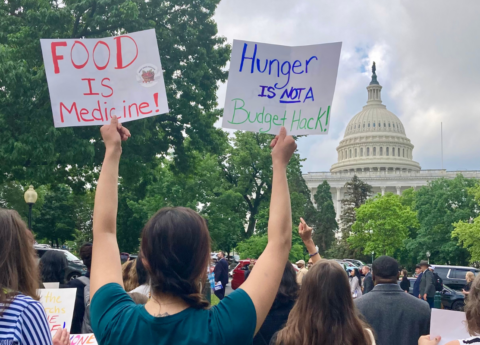Governor Bevin has sent his proposed Medicaid changes to the federal government and now negotiations begin between his administration and the Department of Health and Human Services. Since Kentucky is a national leader in health coverage gains thanks to Medicaid expansion, a lot is at risk in these talks.
The federal government has made clear it simply will not approve the plan as presented because it includes barriers to health coverage that are contrary to the law. At the same time, the governor has suggested he may repeal expansion if it isn’t approved and argues changes must be made to “ensure long-term sustainability of the Medicaid program.”
But in truth, not only can Kentucky afford Medicaid expansion as it is, continuing it is an economic imperative for the Commonwealth. Cutting it back won’t lower costs, but just move where and when they show up while harming Kentucky’s health, economy and quality of life in the process. It’s important to look at the whole picture of the benefits and costs of Medicaid expansion to understand the full impact.
Savings in the proposed changes aren’t from new efficiencies but from causing people to lose coverage — 88,000 fewer Kentuckians would be insured at the end of 5 years. Coverage losses are the result of roadblocks the plan creates, including escalating premiums even for the very poor, lockout periods for those who don’t reenroll and work and community service requirements.
And these so-called savings are negated by new costs the plan introduces.
First is the loss of money to the state economy. Most of Medicaid is paid for by the federal government, meaning $380 million of the $446 million in average annual savings touted in the plan is federal money Kentucky would just be giving up. State leaders would salivate at the prospect of an outside business that would spend $380 million a year in the Kentucky economy, but here we’d be saying “no thanks.” And in this case it’s an industry that not only creates jobs in hospitals and doctors’ offices, but improves health in a place that sorely needs it and saves us state dollars we were previously spending on public health, mental health, substance abuse and care for the uninsured.
What’s more, the much smaller $66 million in annual state savings from the plan quickly evaporates on closer look. Kentucky would have to pay for and manage a complex new bureaucracy under the plan including two health savings accounts per enrollee and systems to track small monthly premium payments, work requirements, health and financial literacy classes and other components. We can learn from the experience of other states here, including those that have abandoned premiums in Medicaid because it costs more to collect them than the revenue generated.
In addition, the loss of coverage means fewer Kentuckians will get the preventive care shown to save money in the long run as chronic conditions are treated and health problems are caught earlier. For example, the plan eliminates preventive dental benefits, but when California did so it saw emergency room visits for dental pain shoot up 68 percent, leading the state to reverse the decision. Also, dental pain is a major gateway to opioid addiction, making getting rid of these benefits more fuel to Kentucky’s raging drug crisis.
Trying to save money in Medicaid by reducing the number of people covered is like squeezing a balloon — it doesn’t make it smaller, but just changes its shape.
In fact Medicaid expansion is a great deal for Kentucky financially and in terms of health. As for Kentucky’s serious budget problems, there are commonsense solutions pursued in other states that can shore up our budget while making the Medicaid expansion an even better deal.
For example, while expanding Medicaid many states have adjusted the provider tax hospitals pay in recognition of the tremendous benefit hospitals receive from more insured patients. Not only has Kentucky not adjusted its tax, but the tax is frozen so it’s paid based on the revenues hospitals received in 2006 rather than the much higher revenues they receive today.
A package of changes like removing the cap on the hospital tax (which is typically accompanied by an uptick in the rates paid to hospitals), increasing Kentucky’s outdated tobacco tax and raising the state’s minimum wage would generate enough revenue and cost savings to fully pay the state’s match for Medicaid expansion. Those changes would further improve Kentucky’s health and economy while making the coverage reductions in the governor’s plan unnecessary.
Our budget challenges don’t mean we have to throw up our hands and say we can’t afford investments like Medicaid expansion that move Kentucky forward. Good solutions are out there that make the entire Commonwealth better off.

